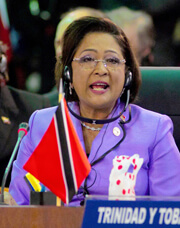Trinidad and Tobago’s petro-driven economy, having been traditionally regarded as a Caribbean gold standard, recent news of very troubling jitters on the economic front cannot but generate real concern, even well beyond the country’s borders. In truth, the fact that the nation, so used to a buoyant economic climate, needed to brace itself for some shockwaves, was a caution that should have been sounded well before the government changed hands last September. With the precipitous decline in oil and gas prices on the world market, negative impact on the country’s economic well being was a given. Leave it to the Kamla Persad-Bissessar administration, before it was ousted, to have barefacedly insisted that everything would be just fine.
The record of the Bissessar government was so chock-full of iniquitous conduct, there would probably be many willing to cite actions taken during the five-year term that were as reprehensible, if not more so, as deliberately misleading the populace on worrisome economic developments. Still, there’s no trivializing how dastardly is withholding the real deal about major energy sector changes adversely affecting people’s livelihoods. What’s even more preposterous, though, is Bissessar’s continuing, even today, to maintain that there was nothing wrong with her government’s handling of the reversed economic fortunes her government came to face. And that included no relent in the government’s profligate ways, clearly indifferent to what the changing times dictated.
In our several well-deserved jabs at the Bissessar administration, while it prolonged its orgy of recklessly abusing the privilege of governance, we regularly settled on “brazen” as most aptly defining the moral tenor of the regime in power. Perhaps it shouldn’t surprise us that “brazen” is no less evident in the M.O. of Bissessar and her minions after having been shown the door by the Trinidad and Tobago electorate. Errol Pilgrim, columnist for Trinidad and Tobago’s weekly Mirror, summed up Bissessar’s election aftermath behavior as pressing on “with one inanity after the other.” One of which being her peculiar conclusion that a recent Standard & Poor’s rating downgrade for the country, from stable to negative, was a vindication of her government’s economic policies. And if that’s not brazen, heaven only knows what is. The Standard & Poor’s action, by the way, coming after Moody’s had also announced a downgrade, while Bissessar and company were still calling the shots.
It had become well established fairly early in the life of the Bissessar government, that scruples were in very short supply. Touted as reflecting the government’s adherence to moral high ground, the firing of one cabinet member in the regime’s infancy for an alleged conflict of interest indiscretion was soon recognized to have been all the way a farce, given the wall-to-wall corrupt practices that became business as usual. Moral failings were indeed overwhelmingly why voters deemed the incumbents unfit to any longer walk the corridors of power. The taint of unprecedented corruption had rested heavily on the Bissessar crew since midway through their tenure, and the results of a series of local elections had underscored the disenchantment in the public square. With a gauge of popular sentiment about her administration that was so crystal clear, a strategy of concentrated focus on Bissessar personally and somehow selling her as disconnected from her government’s enormous baggage was pretty strange as a campaign tactic, hardly becoming the homerun it was crafted to be. Likewise has Bissessar been baffling, in this post-election frame, still seemingly wedded to the idea that her very presence is up to the challenge of reconfiguring ingrained public perception of her unflattering stint at the helm. Her nonsensical response about the bond rating downgrade being “a vindication” classically illustrates the alternate universe she has inhabited before and since her election defeat.
Wherever in the political arena gracelessness is readily identifiable in the package anyone presents, who aspires to standout achievement as a player, the chances of attaining such heights are markedly diminished. On the American scene, for the past seven years we have seen gracelessness in spades, in the disrespect shown President Obama by many in the Republican / Tea Party ranks. In Trinidad and Tobago, Kamla Persad-Bissessar has “distinguished” herself as capable of gracelessness comparable with anyone, anywhere. A telling indicator of how she would treat with the administration that replaced hers was her refusal to congratulate incoming Prime Minister Dr. Keith Rowley on election night…not to mention a refusal to address even her own party supporters.
Trinidad and Tobago’s new economic challenges — to which, beyond energy sector problems, the Bissessar administration’s policies ably contributed — would, in the best of worlds, require of Bissessar, in the national interest, perhaps her finest demonstration of statecraft. No one is fool enough, though, to entertain those expectations.

























